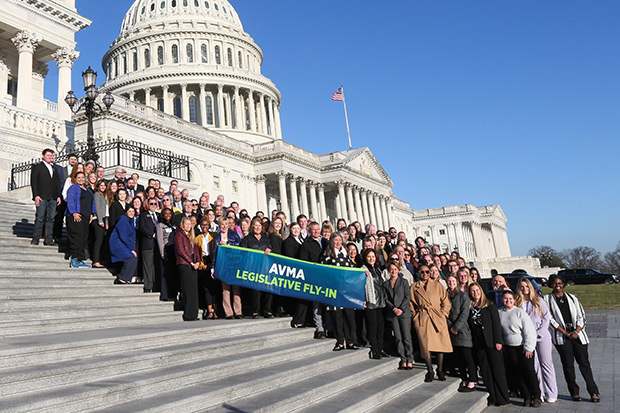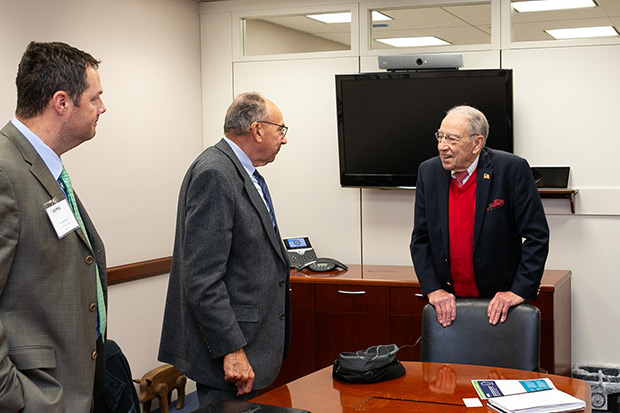Veterinary professionals advocate for healthy dog importation, rural veterinary support on Capitol Hill
Story and photos by R. Scott Nolen
Over 140 veterinarians and veterinary students across 42 states and representing 15 veterinary colleges were on Capitol Hill this February. They sought congressional support for recruiting and retaining veterinarians in rural and underserved areas and providing additional federal resources to strengthen dog importation standards.
More than 180 meetings took place with members of Congress or their staffs during the AVMA annual legislative fly-in, held February 4-6, in Washington, D.C. The AVMA’s advocacy team hosts the annual event in the nation’s capital to teach participants how to effectively advocate on behalf of the veterinary profession within their state and at the federal level.
This year, for the first time, fly-in participants earned 7.5 hours of continuing education.
Importance of advocacy
Dr. Rena Carlson, AVMA president, told fly-in participants, “What Congress does directly impacts your day-to-day work, our profession, and our country’s animal and public health.”
Throughout the training session held on February 5, AVMA’s advocacy team helped participants learn effective ways to engage with their member of Congress and advocate for the profession.
There was also an overview of the AVMA’s federal and state advocacy efforts. The AVMA’s advocacy office in Washington, D.C., works with federal legislators, staff members, departments and agencies, and the courts to advocate for the Association’s positions.
In addition, the AVMA monitors legislation relevant to veterinary medicine at the state level and will provide support to state VMAs when requested.
The first day ended with fly-in participants learning of the range of veterinary-related policy issues AVMA staff members are working on. They were shown the dos and don’ts when meeting with a member of Congress or their staff members, and they were briefed on the legislative issues they would be discussing during their visits with congressional offices.
Healthy Dog Importation Act
The Healthy Dog Importation Act (HR 1184/S 502), supported by the AVMA, would provide the U.S. Department of Agriculture (USDA) with additional tools to monitor and safeguard the health of dogs being imported into the country. For instance, it would mandate that every dog entering the U.S. must be microchipped and accompanied by a health certificate issued by a licensed veterinarian.
Up to 1.245 million dogs are imported into the United States annually, according to the Centers for Disease Control and Prevention (CDC), and most of these animals are personal pets. For the estimated 113,000 dogs imported from countries that are a high risk for rabies transmission, the CDC requires a rabies vaccination certificate and microchip. However, for the 950,000 dogs imported from rabies-free or low-risk countries, the CDC requires no documentation or vaccination. A visual inspection provided by Customs and Border Protection personnel at the first port of entry is the only screening required for these dogs.
The AVMA is asking Congress to include this legislation in the new Farm Bill.
Rural Veterinary Workforce Act
This AVMA-championed bill (HR 4355/S 2829) would end the federal taxation on Veterinary Medicine Loan Repayment Program (VMLRP) awards. The USDA is currently required by statute to pay the tax on behalf of the award recipient out of the funds Congress appropriates for the program. Ending the taxation would end the recycling of appropriated dollars through the USDA back to the Treasury and mirror the way the National Health Services Corps Loan Repayment Program for physicians, dentists, and others works.
The VMLRP helps recruit and retain veterinarians in high-need areas by assisting with educational debt. Participants in the program receive up to $75,000 toward student loan debt in exchange for three years of service in USDA-designated veterinarian shortage situations, particularly in rural areas. This would make the tax treatment of the awards the same as for the National Health Service Corps Loan Repayment Program for physicians, dentists, and others.
In a recent statement issued by Dr. Carlson, she said, “Passage of the bipartisan Rural Veterinary Workforce Act would help address veterinary voids for USDA-designated shortage areas, attract and retain veterinarians by removing the financial barriers related to practicing in underserved communities, and assist veterinary graduates with the significant obstacle of educational debt.”
In 2024, the USDA designated 240 veterinary shortage situations across 47 states—the highest recorded total to date.
Preserving veterinary access to xylazine
Over the past year, the AVMA has been working with Congress, federal agencies, and stakeholders to address the emerging public health threat of illicit xylazine while protecting the unique uses of the animal drug in veterinary medicine.
The animal drug xylazine is being mixed with illicit fentanyl, posing an emerging public health threat. As policy is being developed to curb the illegal supply of xylazine, veterinarians worry new enforcement tools, including scheduling the drug in the Controlled Substances Act, would severely impact legal and responsible access and use of xylazine by veterinarians and their clients putting human safety and animal welfare at risk.
During the fly-in, a targeted selection of meetings took place with lawmakers who are key to a federal solution.
Relationship building
Effective advocacy needs to be a sustained, year-round effort, said Dr. Carlson. She encouraged participants to get involved in the AVMA Congressional Advocacy Network (AVMA CAN), a community of more than 40,000 veterinary professionals and friends of veterinary medicine committed to protecting the profession.
AVMA CAN members are notified when relevant policy issues arise so they can contact their members of Congress to act in the interests of veterinary medicine.
Another key aspect to advocacy Dr. Carlson told fly-in members about is relationships, which she described as “critically important” to the process.
“Building relationships is so important, so that when these issues come up, staff members and legislators think, ‘I know a veterinarian I can talk to about this’ before those (public policy) decisions are made,” Dr. Carlson said.
A version of this story appears in the April 2024 print issue of JAVMA
Fellowship named in honor of Dr. George Bishop
By R. Scott Nolen
The veterinary profession lost a tireless advocate for veterinary medicine with the death of Dr. George W. Bishop this past January at the age of 83.
To honor Dr. Bishop’s work on behalf of the profession, the AVMA Board of Directors approved naming the 2024-25 AVMA Congressional Fellowship in honor of Dr. Bishop.
AVMA congressional fellows spend a year in Washington, D.C., as a scientific advisor across a variety of policy issues.
“Dr. Bishop was a major champion for AVMA’s advocacy efforts and a huge supporter of our congressional fellowship,” said Dr. Lori Teller, the immediate past AVMA president who proposed the change. “He always recognized the tremendous importance of having veterinarians working on Capitol Hill to advance our profession.
“We think naming this year’s congressional fellowship in Dr. Bishop’s memory is one way to honor his legacy.”
In addition, the AVMA Political Action Committee (AVMA PAC) board voted to change its Russell Anthony Impact Award to the George Bishop PAC Award.
A former member of the AVMA Board of Directors (BOD) and House Advisory Committee, Dr. Bishop’s work as a political advocate for his profession spanned more than 35 years and included leadership roles on the AVMA PAC and Legislative Advisory Committee.
His advocacy on behalf of the veterinary profession and the AVMA resulted in Dr. Bishop receiving the AVMA Advocacy Award in 2015, becoming the first clinical veterinarian to do so.
“George was the quintessential person of organized veterinary medicine. He always came to meetings knowing the material in depth, especially financials and legislative issues. He didn’t say much unless asked or if he seriously disagreed with you. His impact at CVMA and AVMA was significant without any fanfare or noise,” said Dr. Richard Sullivan, AVMA BOD member and chair of the Legislative Advisory Committee.
“He touched many people in a quiet and positive way,” Dr. Sullivan added. “Our profession has lost a giant.”
Related content
AVMA members press Congress for illicit xylazine, dog importation laws
In Memory: Bishop prioritized advocacy for veterinary medicine
Veterinarians press lawmakers on rural veterinary shortages, dog importation
From Congress to the courtroom, AVMA advocates for veterinarians
Bill aims to improve dog importation process




